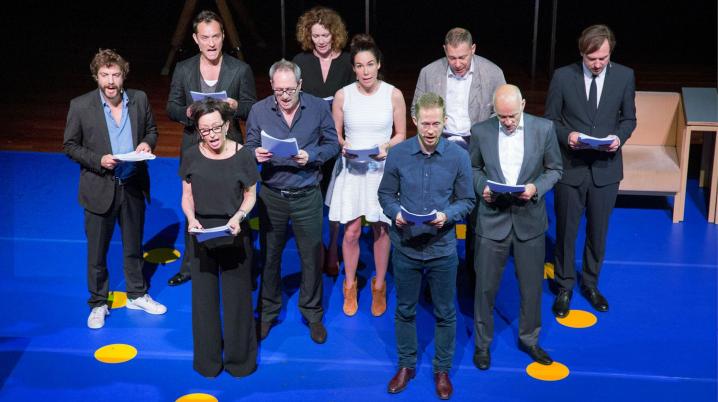Approximately three years after DutchCulture and De Balie co-organised the first edition of Forum on European Culture, one of the main programs, the play Re:Creating Europe by International Theatre Amsterdam (ITA), recently restaged at this year’s Manchester International Festival. As an introduction to the play, prize-winning children’s book writer Michael Morpurgo gave a remarkable speech. The current context of Brexit did not withdraw Morpugo from expressing a passionate plea for the resurrection of a forgotten pursuit of the EU: a peaceful Europe. Read the full text here.
The Phoenix of Peace by Michael Morpurgo
I am not impartial about Europe, and I will not pretend I am. Like it or not, and I do like it, I am European. I am British too, British and European. Like many millions all over Britain and Europe the DNA of my family is a most interesting mix. We are English, Belgian, German, French, Dutch, Croatian, Welsh, Scottish, and Romanian. I live in a country where our royal family has its origins in literally dozens of European countries. They are as European as any of us, and more so than most of us.
Our language, arguably the jewel of our culture, is a mongrel language, a magnificent blend, from all over the British Isles and all over Europe too - from, amongst others: Scandiavia, Italy and Greece, from France and Germany. Our laws and our early religion have their foundations in Rome, our democracy in Athens. Much of our greatest literature has grown out of a European tradition, European history. Shakespeare found much of his inspiration for his plays from European stories, from Hamlet, to Romeo and Juliet, to Julius Caesar. And many of the folk tales and legends we love and grow up with - Grimm, Hans Christian Andersen, and La Fontaine - have their roots in Europe. We do not need a flag or anthem or even a union to be European. We are European. We share her history, her culture, her learning, her glories, and her shames.
Over the centuries we have been allies, then enemies, then allies again, many times over, too many times over, with just about every country in Europe. We have all done war to death, arguably the most belligerent and destructive continent on this earth, the cockpit of the world. If we have one fatal flaw, it is that the nation states of Europe all too often resort to squabbling and fighting to solve problems. And Britain has done its share, been very European in this regard. Like all other countries in Europe, we have invaded, and been invaded. We have known the exultation of victory and the humiliation of defeat. And we have known the loss and suffering.
Here’s the problem, a problem uniquely our own. We are an island. All our lives many of us have thought of Europe as being ‘over there’ or ‘overseas’. ‘Foreigners’ live there. Both geographically and psychologically we are apart. We always have been. The English Channel separates and protects us, has saved us from invasion, though not always. It is our wall against the world, our shelter and our refuge. Once upon a time It was our defence against a hostile world. We could hide behind it, make a fortress of it. Naturally a maritime nation, it was often from the English Channel that we set out to explore the wider world, frequently discovering that other European nations were doing much the same thing, trading, occupying, converting, creating our competing empires. Now we could continue our European squabbling and fighting all over the world.
But thankfully, the days of European empires are gone. These days we like to use the seas around us for travel and tourism and trade. We built a tunnel, we joined Europe physically. And we joined Europe politically. We joined for business, for trade deals. Financially ruined after the Second World War, struggling to recover, profiting less and less from Empire, we needed the money, needed the employment. Europe was close, an important market.
Like countries everywhere, we know and understand very little of the history of others. We each see the world through our own prism, our own perspective. We either did not realise or we forgot the reason the European Union came into existence, and who had created it. A phoenix of peace, inspired by great and good people, was rising from the ashes of the ruins of a Europe that had twice embroiled itself in the most terrible wars the world had ever known. We had dragged the rest of the world into these wars, exporting our special European way of sorting out differences, spreading death and destruction to all corners of the globe.
France and Germany, the two great powers on the European continent, had been warring with one another for three centuries and more, before the Second World War, with Britain and others joining on on one side or the other, whichever was expedient at the time. After World War Two both France and Germany were determined that there should never be another war between them, that they would create a trade agreement, a partnership, so necessary to both countries that it would make war redundant. Cooperation, and mutual benefit, would make conflict and enmity a thing of the past. Trade without barriers between democratic nations, freedom of speech and movement, human rights, work and prosperity for all - this was how the new peace in Europe was to be forged.
It was a dream, a hope, a determination. Other European countries liked the sound of this, a Europe of prosperity and peace. Soon it was a community of six European nations. And Britain, after a while, feeling rather left out, decided she wanted to join, that it was in our interest. We wanted a bit of that prosperity too. We were tentative and suspicious. We had only recently been rulers of a quarter of the earth, we were used to doing things our way. And this European Community was not our initiative. We were late comers to the table of this European family.
Then our application to join was turned down, by France, our nearest neighbour across La Manche, our historic rival. More humiliation. We discovered we were joining a trading club, with club rules made up already by other countries, rules that we were going to have to agree to. At the second attempt we were allowed in, the somewhat grudging 7th member. By now though, peace, the founding motivation behind the creation of this new European Community or Union had all but been forgotten. The talk was all of fishing quotas, and sausages, and the ever burgeoning Burocracy in Brussels. Britain was always the reluctant relative in the family, looking still outside Europe to the United States and the Commonwealth countries for friendship. We stamped our feet and sulked rather a lot. No! No!No!
We had a referendum in Britain a couple of years after we joined to confirm our decision. 60 percent of the people of Britain decided to stay. And stay we did. But did we ever fully embrace the spirit? Did we fly the starry blue European flag? Did we play the magnificent anthem, or was it too German for us, this glorious Ode to Joy? Yes, we did play it, but not too often, and not with much sense of pride in belonging. Did we give much credit to the funds that flowed to Britain from Europe to our farming, to the neediest parts of our country? Did we have much respect for European Human Rights? Not really.
The talk was all of the rules and regulations imposed upon us from Brussels, of our laws and powers and sovereignty being superceded by Europe, of how much it was costing to be a member, of resentment towards what was often perceived as interference from Europe in our lives, in our national affairs, of the growing numbers of countries in the club, of the inexorable push towards an ever greater union with Europe.
Then there was the economic crash and the recession and the austerity, and the growing migrant crisis on the southern borders of Europe, with many thousands of refugees from war and hunger and poverty, seeking safety and a better life in Europe, many of whom were coming our way. And this was when the Conservative government, afeared that it would be overwhelmed at the polls by UKIP, decided for its own political reasons to hold a referendum. It expected to win. It did not. They seemed unaware how alienated and threatened and resentful so many millions of our citizens were feeling. They were feeling left out in the cold, abandoned, ignored. As indeed they have been for decades. In the referendum Europe took the whole blame.
And some blame was justified. The divide between those who have and those who have not is shamefully wide in this country and wide all over Europe. Europe has presided over this, driven as it is by a drive for prosperity that has not been nearly inclusive enough. The rise of populist nationalism common to all European states is no accident, no coincidence. It is rather a consequence of a system that favours those who feather their own nests, rather than creating societies where benefits are more equitably shared. The European Union has itself forgotten its roots, the real reason for its existence.
And we in this country forgot our history, our long tradition of providing refuge for those in greatest need. Do we remember how persecuted Huguenots came here from France long ago, how Jewish people came here over the centuries and made their lives here, and how many of us have migrant roots, how they have become we, how important they and we have been to the culture and economy of this country; how in 1914, 240,OOO war refugees came across the Channel in boats from Belgium, when their country was invaded. They lived amongst us, went to our schools, our hospitals. Whatever happened to that generosity of spirit, that embrace of Europe, of our common humanity. We are in large part a country of migrants, migrants from Europe, from all over the world.
It was natural enough for Britain, the least committed of the European countries, to be the first to break away. We may not be the last if there is not a new renaissance in Europe. Go on as we are and things will fall apart, the centre will not hold. Europe - with Britain still a member, which is my fervent hope - has to remember its history, reinvent itself, reform itself if it is to survive. It is a voluntary gathering of free and democratic nations. If at the heart of Europe democracy is compromised. And at present it is. Then Europe will fail, and should fail.
If instead of the founding spirit of cooperation and friendship, there is, or seems to be, a governance that is remote from the people, and perceived to be coercive, even authoritarian, then the spirit of the founding fathers and mothers, who knew and lived through the horrors of war, will fade and die. I do not want that to happen.
If Europe dies, then prosperity will die, and our blessed peace will die with it. We must not let that happen. I don’t want a divorce. I do not want to be estranged from Europe. It may be a flawed family, but it’s my family. All marriages and partnerships have to be worked at. And I want us in Britain to stay and help make it work.
Let the Phoenix of Peace rise again, and shine. Let her shake the ashes off her wings and fly.



